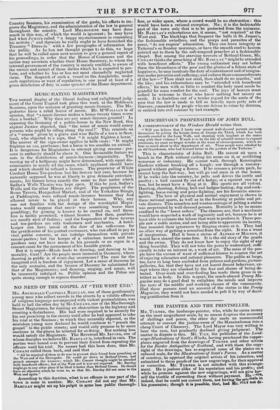MUSIC-HATING MAGISTRATES.
THE annual display of the liberal feeling and enlightened judg- ment of the Great Unpaid took place this week at the Middlesex Sessions, upon the occasion of granting music-licences. The Ma- gistrates have a rabid horror of Music. Mr. M‘WiemAst is of opinion, that "a music-licence makes a house twenty times worse than a brothel." Why then are any music-licences granted? In opposing the licensing of a public-house in the New Road, this sapient Justice objected, that "the noise of music would annoy
persons who might be riding along the road !" This reminds us „ of a "reason given by a grave and wise Bailie of a town in Scot-
and, who objected to a sign, that " it might frighten a horse." The answer of the sign-owner applies in both cases : "It might frighten an ass, perchance ; but a horse is too sensible an animal." It is dangerous for Magistrates to attempt giving reasons : per- sons in authority should be above .it. One favourable feature we note in the distribution of music-licences—impartiality. The tossing up of a halfpenny might have determined, with equal dis- crimination in nearly all the cases, which applicant should have and which should be refused a licence. The proprietor of White Conduit House Tea-gardens lost his licence last year, because he naturally supposed he was at liberty to give dramatic entertain- ments, his licence being exactly the same as that under which Sadler's Wells Theatre was kept open. If this be just, Sadler's Wells and the other Minors are illegal. The proprietors of the Swan Tavern, Hungerford Market, and of the Yorkshire Sting°, at Paddington, were refused music-licences because they had allowed music to be played in their houses. Why, any one not familiar with the doings of the worshipful Magis- trates would suppose that music was something worse than gambling; foe gaming is known to be carried on,. and there- fore is tacitly permitted, without licence. But then, gamblers are, mostly men of fashion ; and the frequenters of these taverns and tea-gardens are only tradesmen and mechanics. A hotel- keeper can have music at the door of his coffeeroom for the gratification of his genteel customers, who can afford to pay to visit public concerts, or can indulge themselves with private music-parties; but the keeper of a suburban tavern and tea- gardens may not have music in his grounds or an organ in a concert-room for the amusement of his humble guests.
But it is urged—Music leads to dancing, and dancing to im- morality. Cant ! Are the people more immoral in Germany, where dancing in public is of every-day occurrence? The cure for the imagined evil is freedom of enjoyment. Let a sense of decorum be . the only restraint, and the licence of Decency be substituted for that of the Magistrates; and dancing, singing, and music, will be innocently indulged in. Public opinion and the Police are quite strong enough to repress disorder.




















 Previous page
Previous page